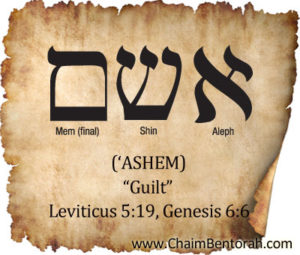HEBREW WORD STUDY – GUILT ‘ASHEM אשם Aleph Shin Final Mem
Leviticus 5:19: “It [is] a guilt offering: he hath certainly trespassed against the LORD.”
Genesis 6:6: “And it repented the LORD that he had made man on the earth, and it grieved him at his heart.”
 I always felt uncomfortable with the rendering of nacham as repent, at least in the context of Genesis 6:6. It is true nacham means to repent however, in English we see repentance as a simple turning away from something or changing direction. But that is teshuvah not nacham. Nacham is a feeling of regret such that you change direction. You commentaries say teshuvah involves sorrow, but that is a traditional rendering not totally in line with its origins.
I always felt uncomfortable with the rendering of nacham as repent, at least in the context of Genesis 6:6. It is true nacham means to repent however, in English we see repentance as a simple turning away from something or changing direction. But that is teshuvah not nacham. Nacham is a feeling of regret such that you change direction. You commentaries say teshuvah involves sorrow, but that is a traditional rendering not totally in line with its origins.
My question, however, is can regret also be a feeling of guilt? Maybe in English but not Hebrew. The Lord did not feel guilty over creating mean, he only felt a sense of regret knowing the sadness that resulted from giving man a free will. The word could also be disappointment.
There is much that can be said about these two verses which I will take upon a later study, but right now I want to show that Biblically regret and guilt are two different things. You can have regret without guilt but not guilt without regret in the Biblical Hebrew. The confusion comes is that in English regret and guilt are almost considered the same thing. Leviticus 5:19 talks about a guilt offering associated with a trespass against the Lord.
In English Webster defines guilt as a feeling of responsibility or regret for some offense, crime, wrong whether real or imagined. Regret is defined as a feeling of sorrow or remorse for an act, fault or disappointment.
In Hebrew, nacham is a change of attitude, a reconsideration. Thus, God does not feel guilty over creating man He just changed his attitude toward man or reconsidered His creation. Hence, he felt regret but not guilt. The Hebrews were told to bring a guilt offering when they sinned against God, not a regret offering. David felt both guilt and regret when he sinned against God with Bathsheba but God forgave Him, yet he still wept, he still felt regret. But he was still able to move forward.
I remember a story I heard as a child. I do not know if it is true or not. But there was this soldier in World War II who was fighting in Germany when the war ended. He and his buddies got the news that the war ended and a few moments later was confronted by a German soldier. The American soldier shouted the war is over and did not raise his rifle. The German soldier, however, fired his rifle, wounding the American soldier in the leg. The German soldier then ran off. The American soldier’s wound was so bad that he was forced to walk with a cane the rest of his life. After the war, he could not find a job as he did not have the education for an office job and he could not work manual labor. He became very bitter that this soldier just shot him after the war was over and in his mind, he shot him out of revenge for being defeated. He began to hate this soldier so much he dreamed of making him suffer as he suffered. This American soldier came into a large inheritance and took that inheritance and went to Germany and hired the best detectives he could find. Before long one of the detectives reported that he found the soldier and gave the American the address. This American took a loaded pistol and went to the address he was given. A woman answered the door and she said the man he was looking for was her husband and she agreed to take the American to him. She took him to a cemetery and pointed out a headstone. The widow then told this American the story. Her husband was very young when forced to join the German army. He saw very little action until the end. He had not heard that the war ended and when he saw the Americans approach him he panicked and fired his rifle. He knew he hit a soldier and thought he killed him so he ran away. An hour later he heard the war had ended. He was so overcome with guilt over having injured or maybe even killed another human being that he fell into a deep depression. The widow said that even after he married he would fall into a deep depression over what he did, he could not live with the guilt and finally took his own life. You can’t move forward with guilt, you need God’s forgiveness.
You see the Hebrew makes a distinction between guilt and regret. With guilt, you withdraw and never move forward. You never re-establish your relationship with God. Guilt just holds you back. But with regret, God forgives you so you can move forward and learn from your mistake. The continual feelings of regret will remind you to never commit that sin again.
I give a perfect example of this in my book, Is This Really Revival offered as a free download on our All Access site.








Um. Jesus is my guilt offering. I am guilty. Jesus died for me, it is no longer I that live but Christ that lives within me. I have regrets, To me , guilt has to do with sin, but regret is more minor.
I love your teaching and appreciate the time you put into this so you can share it with us